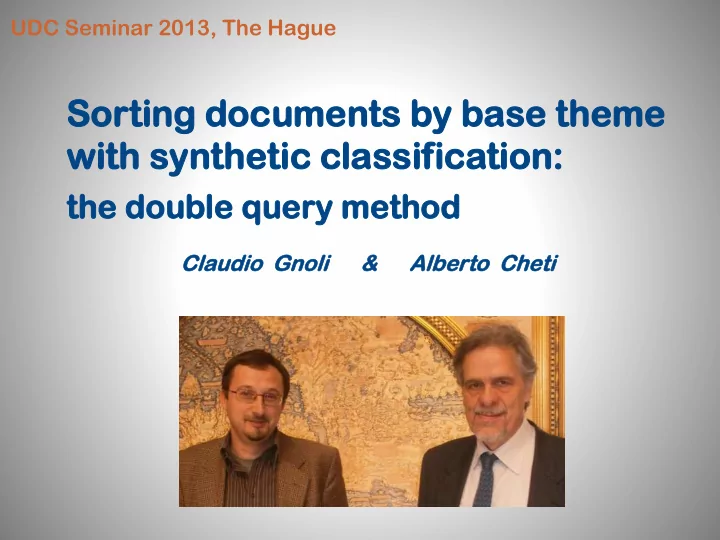

UDC Seminar 2013, The Hague So Sorting ing do documents uments by b y base se the heme me wit ith h sy synt nthe hetic tic cla lass ssif ifica ication: tion: th the e doub ouble le query uery me meth thod od Claudio udio Gn Gnoli oli & Alber berto to Cheti eti
Knowledge organization A to Z ?... Friday Monday Sathurday Sunday Thursday Tuesday Wednesday
Knowledge organization A to Z ?... 1 Sunday A solution: 2 Monday 3 Tuesday good old 4 Wednesday classification :-) 5 Thursday 6 Friday 7 Sathurday
Knowledge organization A to Z ?... Systematic presentation can act as an intellectual guide to contents
Knowledge organization A to Z ?... Original German term: Wissensordnung = “ ordering of knowledge”
Classification Often poorly applied in online resources… Lack of integration between cataloguers’ and OPACmasters’ work [Bland & Stoffan, 2008; Rozman, 2009; Casson et al. 2011]
Compound subjects Most real documents are about combinations of concepts, e.g.: «the corrosion of tinplace by acid fruit products»… [Foskett 1958] Synthetic classmarks needed (subdivisions, auxiliaries, facets, roles, links…)
Citation order matters 1:34 «philosophy – law» 34:1 «law – philosophy»
The PRECIS-GRIS tradition (Verbal) subject strings should be ordered combinations of terms (concepts) Law – influence of philosophy – U.K. – dictionaries
Base vs. particular theme Notions coming from text linguistics [Beaugrande & Dressler 1981] «Influence of the abundance of wild ungulates on wolf diet in Northern Apennines» Wolf – diet – effect of ungulate abundance – N Apennines
Two-step search [GRIS] Interfaces should allow to: -- identify a concept (finding the right term, discarding homographs etc.) -- examine all combinations of it with other concepts …starting with those where it is the base theme!
Double query method Let’s give the user what (s)he’s asked for: (1) all combinations where the search term is the base theme (2) all combinations where the search term is a particular theme
An application
(1) Results as base theme
…either alone or combined…
(2) Results as a particular theme
Double query method $queryA = "SELECT * FROM `literature` WHERE `classmark` REGEXP '^757*' ORDER BY classmark"; $queryB = "SELECT * FROM `literature` WHERE `classmark` REGEXP ';757*' ORDER BY classmark";
Position depends on search
Conclusions -- Principles for combination in verbal indexing (base vs. particular themes) can be extended to classification -- They help users to locate what they are actually searching for among many possible results -- They can be applied to search interfaces by any script (e.g. PHP + MySQL) managing a double query
Thank you! claudio.gnoli@unipv.it @scritur
Recommend
More recommend